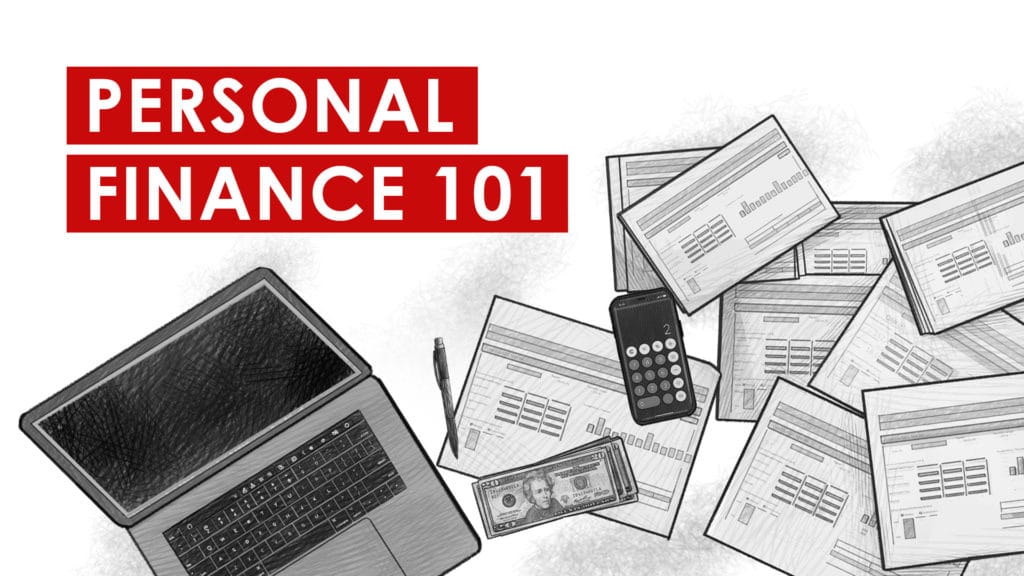Personal Finance 101: 9 Tips To Managing Your Money

Personal financial management is a lifetime task that can be quite intimidating for many.
If you are someone who’s looking to start organizing their finances, effectively manage their money, and be better in making financial decisions, this personal finance guide is for you.
We’ve interviewed finance experts Peter Lazaroff, — author of “Making Money Simple”, Co-Chief Investment Officer of PlanCorp and BrightPlan, and Erin Lowry, — founder of Broke Millennial, a website dedicated to helping millennials in their financial journey. Check out some of the personal financial tips they gave in our guide below.
1. CREATE AND STICK TO YOUR BUDGET
The first step to effective money management is knowing what you’re spending.
Make your budget as detailed as you can and make sure everything is accounted for. This way, you can avoid unnecessary spending.
Some of the best tools and apps you can use are free. There are lots of mobile apps out there that lets you input your numbers and automatically records and computes them for you. Even a simple Google Sheets or Spreadsheet is a powerful tool that can help you keep track of your expenses.
You may also want to evaluate the products and services you use daily and check if there are better deals that can help you keep your spending within your budget. You can use free platforms such as Glimp in comparing those services.
Allocate your budget wisely. Take a second look at your spending, and determine whether they are for important needs or just things you can live without.
One thing to look out for is the “lifestyle creep.”
What is a lifestyle creep?
In this podcast discussion on developing and simplifying your financial plan, Peter Lazaroff describes it as “the slow gradual increase in spending that typically is aligned with the raises we get throughout life, or just some lifestyle expansion.”
When people get salary increases, they also tend to increase their spending amount. This could start on small things like going out to dinner more frequently, buying a nicer bottle of wine, or subscribing to premium channels. These small things when put together, make your total spending amount bigger.
How do you avoid it?
Do not increase your expenses more than your raise. While Peter says you cannot totally avoid lifestyle creep, being proactive by creating a budget and committing to it, will make you a lot less prone to it.
2. CONSIDER HAVING SEPARATE BANK ACCOUNTS
Consider having your checking account separate from your savings account. This is one of the practices you can adopt that is low risk yet offers great advantages.
“[Bank account] it’s more just like a train station where a paycheck comes in and all the money leaves, some of it goes to the emergency fund, some goes to my automatic bill pay, some goes to my credit cards. Very little of it actually lives in my bank account,” Peter Lazaroff describes how he uses separate bank accounts.
The main advantage of keeping your accounts separate is to keep yourself from dipping into your savings or emergency fund. It also makes budgeting and setting aside money for different purposes easier.
While savings accounts yield higher interest, checking accounts typically earn little to no interest. You can use it for withdrawing money for daily needs or paying bills.
3. KEEP TRACK OF YOUR CARD ACTIVITIES
Have you ever experienced credit or debit card fraud? If you haven’t, good for you. But it doesn’t hurt to take precautions.
Another personal finance advice we got from one of our experts, Erin Lowry, is to have a text alert set up on all your cards. Every single time a transaction is made, you should receive a text update.
It is also a good idea to have your bank app on your phone so you can monitor how much money you have. But make sure that your app password is different from your general phone password.
These are not just good fraud precautions, but also constant self-reminders of the money that you’re spending.
4. INVEST IN YOUR RETIREMENT
One of the most common mistakes millennials make is not investing in their retirement early.
If you’re one of those who haven’t started saving for retirement, ask yourself why. Are there any other competing financial goals? Or are you just intimidated by the number of options to choose from?
If you’re a fresh graduate who is just starting out or someone who’s been in a career for years, you can already start saving for your retirement via 401(k), Roth 401(k), traditional IRA, or Roth IRA, depending on what you have access to and your tax preferences.
401(k) vs IRA
401(k)s are offered by employers while IRAs are opened by individuals using brokers or banks.
Traditional vs Roth 401(k)
- 401(k) – in 401(k) or traditional 401(k), contributions are made with pre-tax money. It will only be taxed when you withdraw it during your retirement.
- Roth 401(k) – in Roth 401(k), contributions are made with after-tax money. When you withdraw it during your retirement, it won’t be taxed again.
Traditional IRA vs Roth IRA
- IRA – contributions withdrawn from your traditional IRA before age 59 and a half are taxed at your current income tax rate, and charged with a penalty fee.
- Roth IRA – contributions in Roth IRA can be withdrawn at any time tax-free and penalty-free
Check out this discussion on retirement accounts to decide which is best for you.
If you are in a company that offers 401(k), you’ll want to take this advantage and get your employer to match your contribution.
“I think if you have a 401(k) account, that’s usually the place to start. And that’s largely because usually your employer is going to match your contribution.
So if you’re making $100,000, and they have a 30% match, well, you put 3% of your salary and they’re going to give you $3,000 of free money. And it’s like the only place in the world where you’re going to double your money instantly at no cost. And so that’s a super important contribution,” Peter Lazaroff explains.
Ask your HR or accounting personnel about the details of your 401(k) plan. Better if you can speak to someone from the company that’s in control of your plan.
Here are tips on saving for retirement.
5. PAY OFF YOUR DEBTS
Debt from mortgages, credit cards, student loans, and other personal loans could be a headache, and getting out of them is even more troublesome when they have high interest rates.
So should you start investing first or start paying off your debts first?
Erin Lowry and Robert Leonard shared useful advice here.
If the interest rate on your loan is above 5%, it’s not guaranteed you’re going to make that rate of return if you invest in the markets, especially after taxes. In this case, you’re better off paying that debt.
Whereas if your loan interest rate is below 5%, you probably have a decent chance of getting that return or a higher return in the market. So on a net-net basis, you’re going to be better off investing in stocks.
But then, if your debt literally keeps you up all night and stresses you, pay it off.
Be organized and face your numbers. List down how much debt you have, their minimum monthly payment, interest rates, and principal balance. Then formulate your strategy based on all the information you have.
Paying off your debts puts you in a better position financially. It will also allow you to reallocate your funds to other important things like investments or retirement savings.
6. START AN EMERGENCY FUND
An emergency fund should serve as your fund for when you couldn’t work or in times of financial distress and unexpected expenses.
How much should you target to save in an emergency fund?
Peter Lazaroff says that it should be anywhere between three and 12 months of your living expenses. Living expenses include rent, utilities, food, insurance, and other necessities.
The more job security you have, the less emergency fund you need. For example, if you’re a tenured professor, you probably don’t need much. However, if you’re doing freelance work, you need more.
While this three-to-12-month amount seems daunting to many, keep in mind that emergency funds are built over time. You don’t have to do it all overnight.
More on how you should invest in your emergency fund with Chris Kawaja.
7. SET YOUR OWN REALISTIC GOAL
Whether you are investing for retirement, paying your debts, or saving for a weekend family getaway, it’s good to have a goal. Be very clear on what your goals are and what you will need to achieve them.
Personal finance is personal. What may be working for others may not necessarily work for you. Comparing your numbers to others who are in a totally different situation won’t probably do you any good. This is why it is important that you set your own realistic goal.
It might also help if you divide your long-term goals into smaller ones.
As Erin Lowry advises, “If you have a big overarching goal, and I feel like so many people right now, it’s like, I want to reach a million dollars by x age. So if that’s your goal, great. But then niche it down to say, you know, how much each month of this year do I want to be putting away to service that overall larger goal…”
8. KNOW WHEN TO HIRE A FINANCIAL ADVISOR
When you start dealing with more complex financial matters like estate plans or taxes, it might be best to hire a professional financial advisor to manage your finances.
Here are some tips from experts on hiring a financial advisor:
- Check their credentials, make sure they are a Certified Financial Planner.
- Understand how they are getting paid. If they do take commission, understand exactly when and how, and if that’s impacting your overall portfolio or financial plan.
- Find an advisor who’s a fiduciary. It means that by law, they have to put the client’s interests above everyone else’s including their own.
Listen to this discussion on developing and simplifying your financial plan to learn more about the criteria you should look for when hiring a financial advisor.
9. DON’T STOP LEARNING ABOUT FINANCE
You reading this personal finance guide means that you’re on the right track.
There are a lot of free resources that can help you dig deep into various finance topics. Reading finance books and blogs, watching money talk shows, or listening to podcasts in your spare time would gradually increase your knowledge in finance. Even our experts like Peter Lazaroff spent time reading CNN’s money tab and personal finance tab.
Here at The Investor’s Podcast Network, aside from our free podcast shows, we have various financial resources to inspire you such as our compilations of billionaires’ secrets to success, billionaires’ favorite books, comprehensive investing courses, and stock investing tools. To start investing, check out our ultimate guide for beginner investors.
Check them out to see if we’re the right fit for your learning needs.












